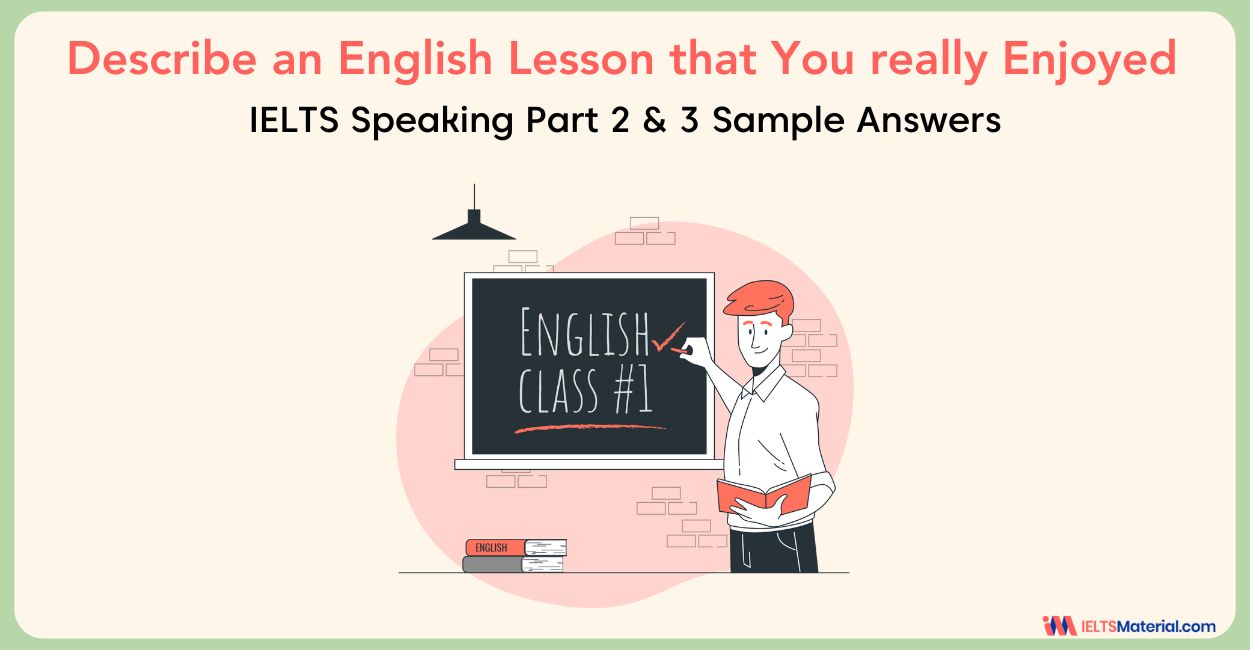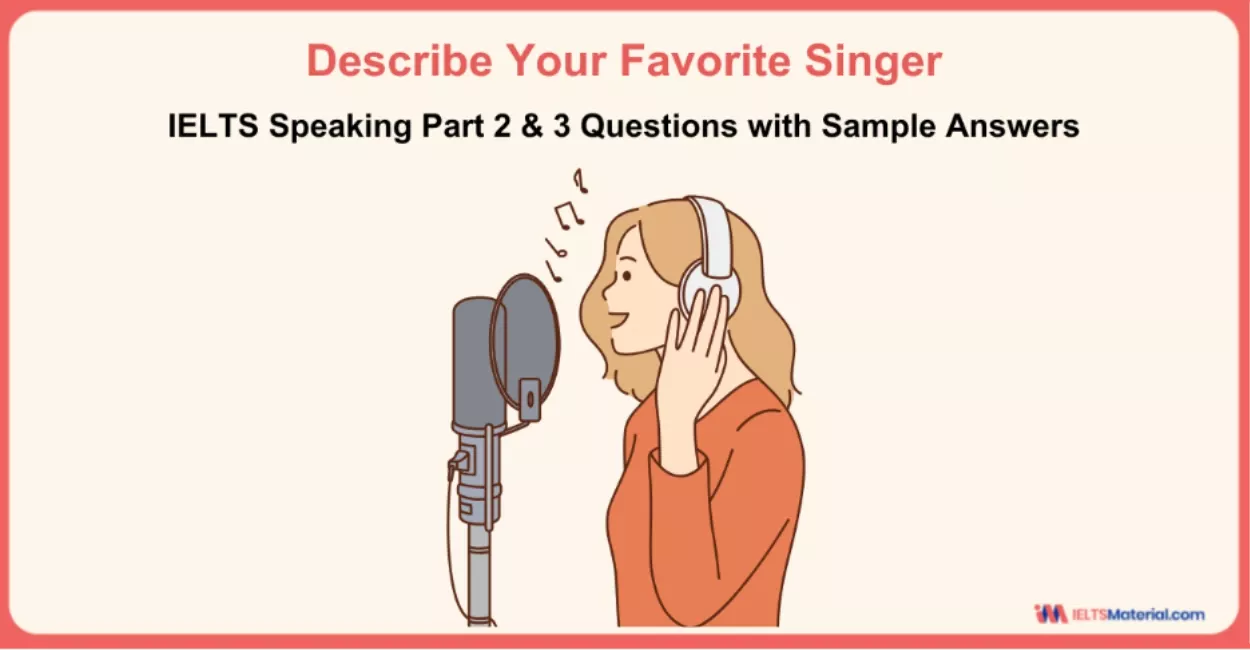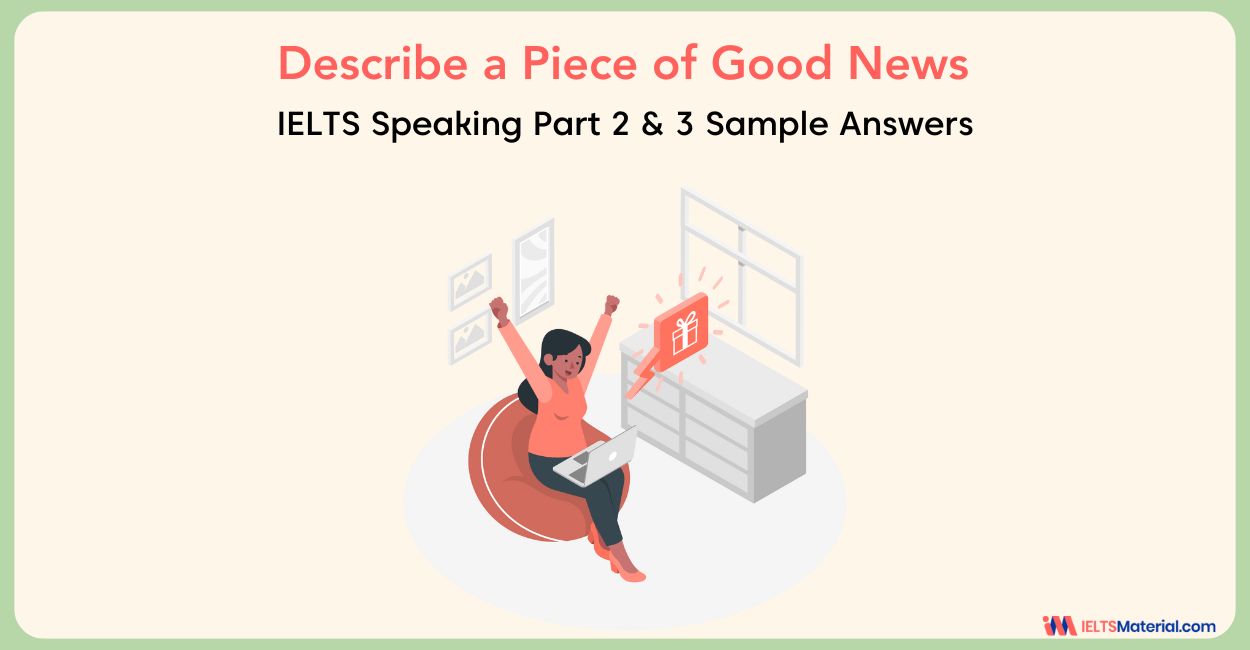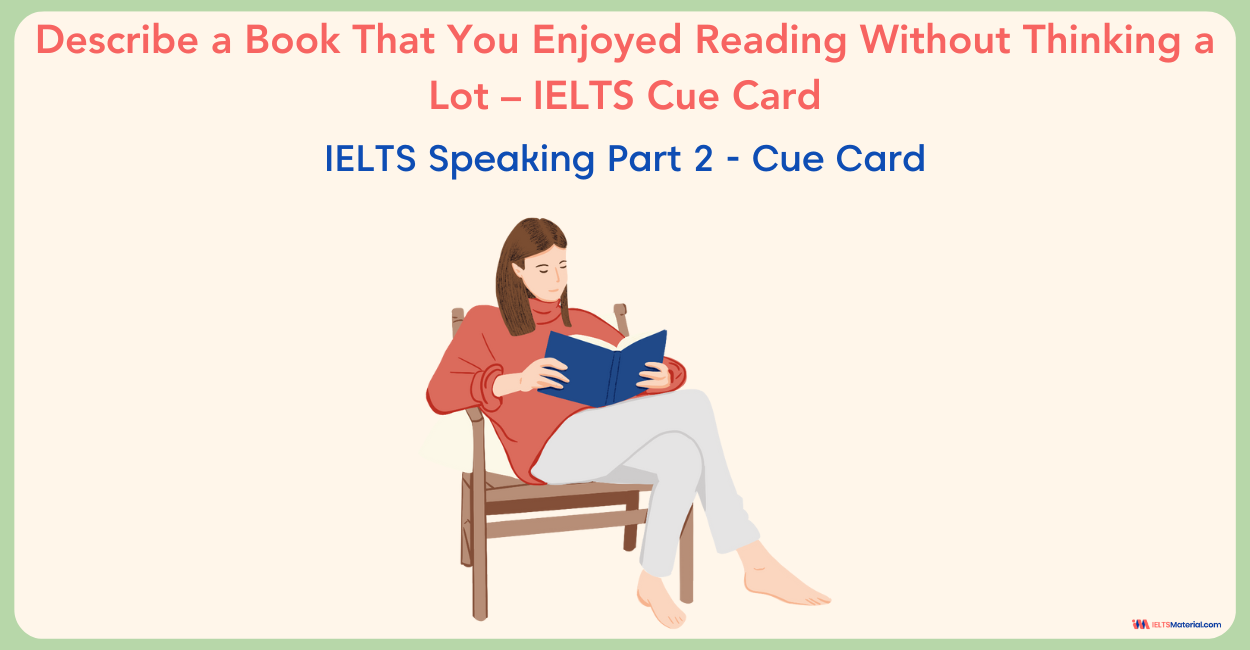Describe an English Lesson that You really Enjoyed - IELTS Cue Card
9 min read
Updated On
-
Copy link
Struggling with the IELTS Speaking test? Master your response with our detailed guide on "Describe an English Lesson that You Really Enjoyed." Explore practical sample answers and vocabulary to boost your score!
Table of Contents
- Describe an English Lesson that You really Enjoyed – IELTS Cue Card Sample Answer 1
- Describe an English Lesson that You really Enjoyed – IELTS Cue Card Sample Answer 2
- Describe an English Lesson that You really Enjoyed – IELTS Cue Card Sample Answer 3
- Describe an English Lesson that You really Enjoyed – IELTS Part 3 Follow-up Questions

Get a Complimentary IELTS Speaking Strategies PDF
The IELTS Speaking tests your ability to communicate effectively in English through a structured conversation with an examiner. The IELTS Speaking Part 2 provides a topic and prompts for you to prepare a short speech, showcasing your fluency and coherence. In this blog, we delve into sample answers on the IELTS cue card topic, 'Describe an English Lesson that You really Enjoyed’ to help candidates excel in their speaking test.
Before you begin, enhance your IELTS Speaking test skills and fluency using the guide provided below!
In IELTS Speaking, you should focus on one idea only and then expand that idea into a long meaningful sentence using IELTS Grammar patterns and IELTS Vocabulary. So, try practising this topic for Part 2 of the cue card for your IELTS Speaking and achieve a good IELTS Band Score!
Learning a foreign language can be challenging for some and enjoyable for others, depending on the teaching technique involved and the teacher. In this IELTS Speaking cue card, ‘Describe An English Lesson IELTS’, you will have to prepare within 1 minute and communicate effectively within 3-4 minutes. So, let us have a look at 3 sample answers on the cue card topic, ‘Describe an English Lesson that You really Enjoyed’ as well as some Part 3 follow-up questions related to it. They will guide you on how to communicate clearly and successfully through the sample answers, related vocabulary and audio.
Describe an English Lesson that You really Enjoyed.
You should say
- When was it?
- What was it about?
- What happened?
- And explain why you liked it.
Describe an English Lesson that You really Enjoyed – IELTS Cue Card Sample Answer 1
Click on the audio below to listen to the sample answer below. Pay attention to the intonation and pronunciation of the words.
- When was it?
I have enrolled in many English courses over the years, only a few of which were actually high quality and helpful. One of the lessons I remember the most was the one during my senior year in high school which was delivered by Ms. Alex – our substitute teacher who was incredibly inspiring and humorous.
- What was it about?
- What happened?
Since our main teacher was on holiday leave, Ms. Alex attended our class for only one day but it was enough for her to leave a profound impression on us. She was younger than other teachers, but definitely wasn’t less experienced. Though she hadn’t been teaching for more than a few years, her confidence and wide breadth of knowledge blew our mind. We didn’t have a new lesson on that day, but a revision instead; therefore, Ms. Alex had prepared lots of interesting activities for us, which created a cheerful and energetic atmosphere within the classroom. We were able to participate in many games such as charades and bingos, revising old vocab and grammar as well as learning new things through her stories. She didn’t do all the speaking but encouraged us to voice our ideas and thinking, which made most of us feel uncomfortable at first since that was not how we were used to. However, in the end, everyone actively engaged in the games.
- And explain why you liked it.
Thanks to Ms. Alex, we had an opportunity to experience a very unconventional teaching method that didn’t make us bored out of our mind but actually was enticing, which I was so thankful for.
Is it hard for you to speak for cue cards like this one for IELTS Speaking Part 2? Book a FREE Demo!
Describe an English Lesson that You really Enjoyed – IELTS Cue Card Sample Answer 2
- Introduction
I have had a plethora of pleasant experiences in the English language so far. However, here I’d like to share one of the best experiences at my university.
- When was it?
- What was it about?
It was during a grammar lesson. Our English teacher was quite ill so she couldn’t attend the class. Since our final exams were just around the corner, a substitute teacher came to take up the lecture. Mrs. Singh delivered a marvelous lecture about how the entertainment industry can help us sharpen our English skills.
- What happened?
Throughout the lecture, she patiently explained to us the process of learning the language and how movies and TV serials play an integral role in helping us immerse ourselves in the language. Right from basic vocabulary to advanced grammar, we can learn almost everything from these shows. This way, we can effortlessly improve our language skills and can get a grip on English with ease.
- And explain why you liked it.
In the beginning, I was quite skeptical regarding this new notion that we were introduced to. However, since the time I commenced watching short videos to practise and tried this method at home, I was convinced that watching movies and learning English can surely go hand-to-hand.
- Conclusion
I enjoyed the lesson to a great extent and found the method effective as well. I was already bored of learning through the traditional method. However, as soon as I started watching movies and TV series with subtitles on, everything started improving. And now, I can concentrate much more than before, and I am now on the verge of mastering this language.
Describe an English Lesson that You really Enjoyed – IELTS Cue Card Sample Answer 3
- Introduction
Since my father had a transferable job, I had switched around 10 schools. It is one of those schools where I met Sister Mary.
- When was it?
I still remember that first day I attended her class in middle school. Usually, language teachers in government schools do not put much effort into teaching in an interactive and fun way. But Sister Mary had a knack of making learning engaging and a two-way process.
- What was it about?
The lesson we were studying was a story named ‘The Gift of the Magi’ by O’ Henry. Instead of reading the story aloud and explaining the meaning, Sister Mary divided us into groups and made us enact the story. While some acted as Jim, the others played the part of Della.
- What happened?
Initially, some were hesitant. However, she encouraged us and as the enactment progressed, everyone had a blast. After the impromptu performance, we had an open discussion about the moral of the story. But, it was not the end. We were given a task to write our own version of the story, which we discussed the next day.
- And explain why you liked it.
To be honest, I was used to rote learning and this interactive lesson was a breath of fresh air for me. I felt that this lesson not only taught the value of love and selflessness as we stepped into the shoes of the characters, but also reminded us that the most precious gifts are often those that come from the heart. She sparked our creativity, encouraged teamwork, and instilled important values.
- Conclusion
It was more than just a lesson; it was an unforgettable experience that left a lasting impression on all of us.
Check Out – My Strategy for IELTS Speaking Part 2
Vocabulary You Can Use to Answer IELTS Speaking Part 2 Questions on Describe an English Lesson that You really Enjoyed
- Substitute
Meaning: a person or thing that you use or have instead of the one you normally use or have
Example: Malinda was a substitute for the nanny who was absent.
- Blow one’s mind
Meaning: affect someone very strongly
Example: The magic tricks blew my mind.
- Unconventional
Meaning: not following what is done or considered normal or acceptable by most people; different and interesting
Example: The unconventional life of the gypsies interests me a lot.
- Bored out of one’s mind
Meaning: extremely bored
Example: Everyone in the lecture was bored out of their mind.
- Enticing
Meaning: something that is enticing is so attractive and interesting that you want to have it or know more about it
Example: The store was giving some enticing offers to make more profit in this quarter.
- Skeptical
Meaning: having doubts or reservations about something; inclined to question or challenge
Example: Mr. John is skeptical about the workings of the startups in the country.
- Impromptu
Meaning: done without preparation or rehearsal; improvised
Example: The impromptu street performance by the students impressed the by-passers.
- Rote learning
Meaning: memorizing information by repetition without necessarily understanding the underlying concepts
Example: Rote learning does not help build creative thinking and problem solving skills.
- Step into the shoes of
Meaning: to imagine oneself in someone else’s situation or circumstances
Example: Nobody understands the pain unless they step into the shoes of the victim.
- Breath of fresh air
Meaning: something new, different, or refreshing that brings positive change or relief from monotony
Example: The staycation in the mountains is a breath of fresh air for us.
Check Out – How to Answer IELTS Speaking Part 3 ?
Describe an English Lesson that You really Enjoyed – IELTS Part 3 Follow-up Questions
- What are the benefits of learning a foreign language?/Why do people learn foreign languages?
There are several advantages to learning a foreign language. Firstly, proficiency in a foreign language enables people to communicate with people from around the world. Secondly, it provides a range of employment options in global fields as business, diplomacy, and tourism. Thirdly, studying a foreign language promotes personal development by increasing confidence and adaptability. Lastly, it improves intercultural understanding by offering an insight into many cultures and customs.
- What makes a good foreign language teacher?
I think language ability, cultural awareness, and well-designed teaching methods are qualities of a successful foreign language teacher. They should motivate students with interactive instruction, create a supportive learning atmosphere, promote active engagement, and offer helpful criticism to improve upon the language skills.
- What are the benefits of being a foreign language teacher?
Teaching other languages has several benefits. It presents opportunities for professional and personal development, such as skill improvement, job satisfaction, and cultural interchange. Moreover, it provides immense satisfaction when students are able to share their love of languages and cultures. Furthermore, it cultivates relationships with varied groups and encourages lifelong education.
- Will computers replace foreign language teachers in the future?
While computers and other technological tools are becoming increasingly vital for language acquisition, it is unlikely that they will ever be able to replace human foreign language teachers. It is mostly because technology cannot completely replace the special abilities that human teachers provide, such as empathy, flexibility, and individualized training. As a result, even though technology might improve language acquisition, the role of human teachers in education will never diminish.
- Is grammar the most difficult part about learning a foreign language?
In my opinion, grammar can be challenging for some language learners, but it is not the most difficult part. Pronunciation, vocabulary and colloquialism can also pose complications in the language learning process. So, it mostly depends on the complexity of the target language’s grammar, teaching styles and, obviously, the learner’s learning capacity.
- Do you think grammar is important in language learning?
Yes, grammar is crucial to learning a language since it offers the framework and guidelines required for clear communication. It helps students construct proper sentences, communicate ideas clearly, and understand both written and spoken language. Although grammatical errors can still be used to communicate, learning grammar improves language use in terms of fluency, clarity, and precision.
Take advantage of our 4.5+ rated Speaking book! Buy Now!
Vocabulary You Can Use to Answer IELTS Speaking Part 3 Questions on Describe an English Lesson that You really Enjoyed
- Intercultural
Meaning: involving interactions between different cultures
Example: Globalization has strengthened intercultural communication.
- Language acquisition
Meaning: the process of learning and acquiring a new language, typically through exposure, practice, and instruction
Example: Ms. Lily had helped me in the process of language acquisition.
- Empathy
Meaning: ability to understand and share the feelings and perspectives of others
Example: The selfish giant lacked empathy in the beginning.
- Colloquialism
Meaning: informal or everyday language and expressions commonly used in casual conversation within a particular region or community
Example: Learning colloquialism is an integral part of learning a foreign language.
- Precision
Meaning: accuracy, exactness, or meticulousness in language, actions, or measurements
Example: The tailor does his work with a lot of precision.
Are you having difficulty speaking for IELTS Speaking Part 2 cue cards like this one? Book a FREE Demo!
Also Check:
- Describe an interesting talk or a lecture you have heard – IELTS Cue Card
- IELTS Speaking Practice Test 20 Topic: English Class Activities
- Describe a Time When you Learned Something New- IELTS Cue Card
- Common Mistakes to Avoid in the IELTS Speaking Test
- Describe a course or subject you would like to take in the future – IELTS Cue Card Sample Answers
- IELTS Speaking tips and hints to get IELTS band score 8
- Describe a subject that you did not like in the past, but now you like it – IELTS Cue Card Sample Answers
- Describe your Education: IELTS Speaking Part 1 Sample Answer
- Idioms for IELTS Speaking
- Describe Something Important You Have Learned Recently- IELTS Cue Card
- 50 Recent IELTS Speaking Part 2 and 3 Topics with Model Answers for IELTS

Bonus IELTS Speaking part questions with Answers








Post your Comments